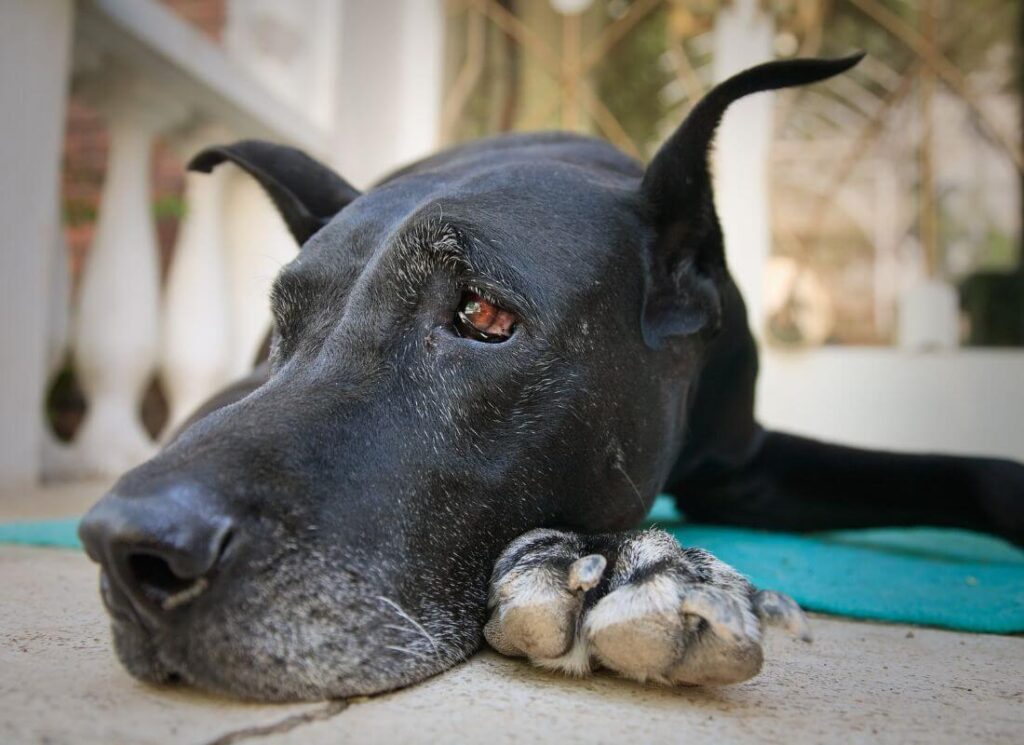We’ve already written a few posts about dog food & DCM in Great Danes, but haven’t yet compiled a list of helpful topics, links, and science on it. This dog food DCM article will be ongoing and updated often. If you are concerned about nutritional DCM, or if your Great Dane was diagnosed with DCM (dilated cardiomyopathy) or heart disease, this blog should serve as a resource for you.
If you would like to click open some of our most popular nutritional DCM resources, start here (they will open in a new tab for you). Many other links are posted in the blog text below as well.
Should I feed Grain-Free Dog Food?
Judy Morgan, the FDA, and Pseudoscience

What is Nutritional DCM in Dogs?
Nutritional DCM, or “dog food DCM” is when a dog develops dilated cardiomyopathy (heart problems) because of unbalanced or poorly formulated nutrition. While some people believe this is a hoax, the relationship between bad nutrition and health problems in animals is well documented.
In other words, this is a well-known and studied phenomenon. For example, in the not-so-distant past, cats were turning up with dilated cardiomyopathy. Pet food manufacturers responded to this by researching the problem and learning that for cats, it was related to nutritional deficiencies.
Cat foods were adjusted and from that point forward, the problem went away. Here is an article from 1987 that covers this event: https://www.latimes.com/archives/la-xpm-1987-08-14-mn-805-story.html
For cats, who have a limited ability to make their own taurine, it was a simple solution. Adding taurine to the diet solved the problem. For dogs (who are much more able to synthesize their own taurine from other amino acids), it’s a lot more complicated.
Below I’m sharing some nutritional DCM facts, as well as scientific research and links. In the interest of keeping this article clean and free of bias, we will not be using any affiliate links in the text of the post.

Nutritional DCM Facts
Here are some facts about nutritional DCM Dilated Cardiomyopathy that you may not know.
Nutritional Dilated Cardiomyopathy (DCM) in dogs is a serious heart condition that has been associated with certain dietary factors. Here are some key facts about nutritional DCM:
- Definition: Nutritional DCM is a heart disease that affects the heart muscle, leading to its enlargement and weakened contractions.
- Link to Diet: Research has suggested a potential link between certain grain-free and boutique diets and an increased risk of DCM in dogs. Diets high in peas, lentils, and potatoes are specifically under scrutiny. Adding grains to the diet does NOT solve this problem!
- Taurine Deficiency: Taurine is an amino acid essential for heart health in dogs. Some cases of DCM have been associated with taurine deficiency, though not all affected dogs are deficient, and not all taurine-deficient dogs develop DCM. Adding taurine to the diet does not necessarily solve this problem.
- Affected Breeds: While initially observed more in breeds predisposed to DCM, such as Doberman Pinschers and Boxers, nutritional DCM has been reported across various breeds, including those not historically prone to the disease.
- FDA Investigation: The U.S. Food and Drug Administration (FDA) began investigating the potential link between certain diets and DCM in dogs in 2018. The investigation is ongoing, and updates are periodically released.
- Importance of Balanced Nutrition: While the investigation continues, it is crucial for dog owners to provide a well-balanced and nutritionally complete diet. Consultation with a veterinarian is advisable to determine the most appropriate diet for an individual dog based on its breed, age, and health status.
- Diagnostics and Monitoring: Diagnosis of DCM involves a thorough veterinary examination, including imaging techniques like echocardiography. Regular veterinary check-ups and monitoring are essential for early detection and management.
- Treatment: Treatment may involve dietary adjustments, taurine supplementation, and medications to manage heart function. However, outcomes vary, and some cases may be challenging to manage.
- Prevention: Until more is known about the specific dietary factors contributing to DCM, prevention involves choosing dog foods with complete and balanced nutrition, and consulting with a veterinarian to tailor the diet to the individual needs of the dog.
- Ongoing Research: The understanding of nutritional DCM in dogs is evolving, and ongoing research is essential to uncover the precise factors contributing to this condition. Veterinarians play a crucial role in staying informed and guiding dog owners in making informed dietary choices.

DCM & Dog Food Research
It’s important to keep in mind that many sources of information on nutritional DCM are extremely biased. “Holistic” veterinarians don’t like this discussion because it directly implicates dog food diets that they promote as healthier (for example, grain-free diets from small dog food companies).
A great example of this can be seen here, by influencer Judy Morgan and her inflammatory take on the FDA statements about DCM research.
We recommend looking at scientific sources and links, and listening to professionals who have obtained board certifications in their speciality (cardiology, nutrition, internal medicine) when it comes to forming beliefs about nutritional DCM.
Contrary to popular belief, the FDA has not ‘debunked’ anything, and dedicated research into the mechanisms behind dilated cardiomyopathy is ongoing.
Like many blogs, Hello Danes is a profit-driven resource. However, we make it a point to share information and form opinions based on boarded professionals, veterinary research, and legitimate science; not anecdotes. We encourage you to click on the research articles we share and form your own opinion, too!

Dog Food & DCM Science & Links
All Trades DVM DCM Timeline – this is incredibly comprehensive and loaded with direct links to scientific studies on the topic:
https://www.alltradesdvm.com/topics/diet-associated-dcm/dcm-timeline
The most recent study, shows yet again that pulse ingredients can cause changes to the heart muscle:
The Diet-Associated Dilated Cardiomyopathy DCM in Dogs group on Facebook is eye-opening. They document confirmed cases of nutritional DCM, including the dog’s age, breed, and foods that the dog had been eating at the time of their diagnosis.
Diet-Associated Dilated Cardiomyopathy (DCM) in Dogs
A team of veterinary specialists and professionals runs the DCM Dog Food website. It has a wealth of information, FAQ’s, and research:
https://dcmdogfood.com/taurine-dcm-faq/
https://dcmdogfood.com
This UC DAVIS Study is seeking participants. If your dog has been eating a commercial diet (grain-free or grain-inclusive) for the last 6 months and does not have congenital heart disease, they may be eligible to participate:
UC DAVIS DCM Research Study Information
The Great Dane Club of America posted a 2002 research update into genetic (congenital) DCM in Great Danes. This is unrelated to nutritional DCM, however, has important information for Dane owners on what to look for:
https://gdca.org/wp-content/uploads/2018/11/Great-Dane-102.pdf

Nutritional DCM in Great Danes
I did a quick search in the Diet-Associated Dilated Cardiomyopathy group for ‘Great Dane’ and the results were heart-wrenching.
Within minutes I found story after story of Great Danes that had been fed boutique foods and grain-free diets who suffered from an enlarged heart.
These cases were all well documented and had been diagnosed and confirmed by veterinary cardiologists.
Many of them were reversed by switching to Purina Pro Plan Large Breed. For some, it was too late. In a quick search, the food I saw repeated most often as a culprit was Taste of the Wild.
That’s just one brand of many formulas that are popular among Great Dane owners.
If you want my personal opinion, you could not pay me to feed Taste of the Wild or any other label manufactured by its co-packing company, Diamond Pet Foods. This includes Diamond Naturals, Nutra Nuggets, Costco/Kirkland, and Solid Gold.
Even if many dogs seem fine on the grain-inclusive versions of these foods, this company is perfectly willing to ignore DCM research and keep foods, such as Taste of the Wild (TOTW) grain-free on the shelves.
Honestly? The Great Dane community should be much more alarmed about this than they currently are.
It’s not just about grain-free foods. It’s about formulation. At minimum, dog food companies should be employing people who are qualified to design pet foods. Unfortunately, many do not. They can make plenty of money by investing instead in fancy packaging and marketing claims.
I searched two brands at the Pet Nutrition Alliance. One of them was Purina (the company with the largest market share by miles, and no verified nutritional DCM cases), and one of them was Diamond Pet Foods (the makers of Taste of the Wild, who has a very small market share and many verified DCM cases).
Can you guess which is which on the infographic below?

Here are other popular brands in the Great Dane community that do not have qualified staff to formulate the diets:
Fromm Family Foods – Formulated by a chemical engineer. In 2023 they promoted a PhD in Animal Nutrition on their staff, and we hope to see positive changes.
Victor – Formulated by somebody with an M.S. in animal science (not nutrition) and a simple online “nutrition certification”. See also their questionable quality control history, here.
Holistic Select, Wellness Core, Eagle Pack – Information is not available from any source, indicating that they do not have qualified people formulating the diets that they sell under different brand names, and do not wish that information to be public
Diamond: Diamond Naturals, Taste of the Wild, 4Health, Nutra-Nuggets, Costco/Kirkland, Solid Gold – “Consults with an M.S. in Animal Nutrition”. This means that across multiple labels, nobody is on staff to formulate the diets, and their off-site consultant is only marginally qualified
Study after study shows that when it comes to giant breed dogs, and in particular giant breed puppies, choosing a well-balanced and professionally formulated, highly-researched food that has been subjected to feeding trials is incredibly important.

Nutritional DCM & Our Recommendations for Great Dane Owners
We’ve dug into the links, science, and research so that you don’t have to.
We’re making every effort to present factual, science-backed information that the solid majority of veterinarians and veterinary specialists would support, and we are open to being challenged by reputable sources.
Knowing this, here are the recommendations that we unapologetically make:
- Choose a dry food from a well-known brand that is committed to research and that has at least one AVCN Diplomate (Board Certified Veterinary Nutritionist) on staff
- Feed a grain-inclusive diet
- Avoid kibbles that have a lot of peas, potatoes, lentils, or legumes in the first 10 ingredients
- Consider getting an echocardiogram for your dog if you’ve been feeding a grain-free or boutique food brand (some dogs will be just fine, but if they aren’t? Catching it early and switching diets is key)
- Report health issues that may be related to diet (including heart disease, illness, or otherwise) to the FDA. Their food reporting form can be found HERE: https://www.fda.gov/animal-veterinary/report-problem/how-report-pet-food-complaint
- If your dog is suffering from chronic loose stools, skin conditions, muscle wasting, low energy, or allergies, see your veterinarian, take their advice, and don’t be afraid to consider a therapeutic (“prescription” diet) or a consultation with a specialist (dermatology, cardiology, internal medicine, etc.)

Recommended Dog Food Brands That Don’t Cause DCM
The following food brands are NOT associated with cases of preventable nutritional DCM, and are highly recommended by this blog, veterinary professionals, veterinary nutritionists, and top breeders. This is the only paragraph in this post containing Chewy affiliate links – which we could pull for ANY number of brands and formulas.
These are the only ones we are comfortable recommending to Great Dane owners. We will not recommend brands that we feel are unsafe to feed, and for that reason, this is all you will find on our list:
- Purina Pro Plan Sensitive Skin and Stomach Large Breed (Salmon based, chicken free)
- Purina Pro Plan Large Breed Shredded Chicken & Rice (Large Pieces & Chicken Shreds!)
- Purina Pro Plan Large Breed Weight Management (Get the weight off)
- Purina Pro Plan Large Breed Bright Mind Age 7+ (for Senior Great Danes)
- Purina Pro Plan Giant Breed (Hard to find, might be discontinued)
- Royal Canin Giant Breed (Amazing for dogs with chronic loose stools, TOP TIER)
- Eukanuba Large Breed (Great for active and sport dogs)
- Purina One Smart Blend Large Breed (Fantastic budget-friendly option)
- Hill’s Science Diet Large Breed Beef & Rice
- Purina Pro Plan 30/20 Sport Beef & Bison
- Purina Pro Plan Large Breed Puppy – any flavor!
- Purina Pro Plan Sensitive Skin & Stomach Large Breed puppy – TOP PICK, salmon-based
- Eukanuba Large Breed Puppy (Great for active and sporting dogs)
- Purina One Large Breed Puppy (Excellent budget option)
- Hill’s Science Diet Puppy Large Breed
- Royal Canin Giant Puppy Dry Dog food (to age 12 months) – TOP PICK, PREMIUM OPTION
- Royal Canin Giant Junior Dry Dog food (8-24 months)
- Purina Large Breed Puppy Chow
Check out THE GIANT DOG FOOD PROJECT to compare brands and values.




